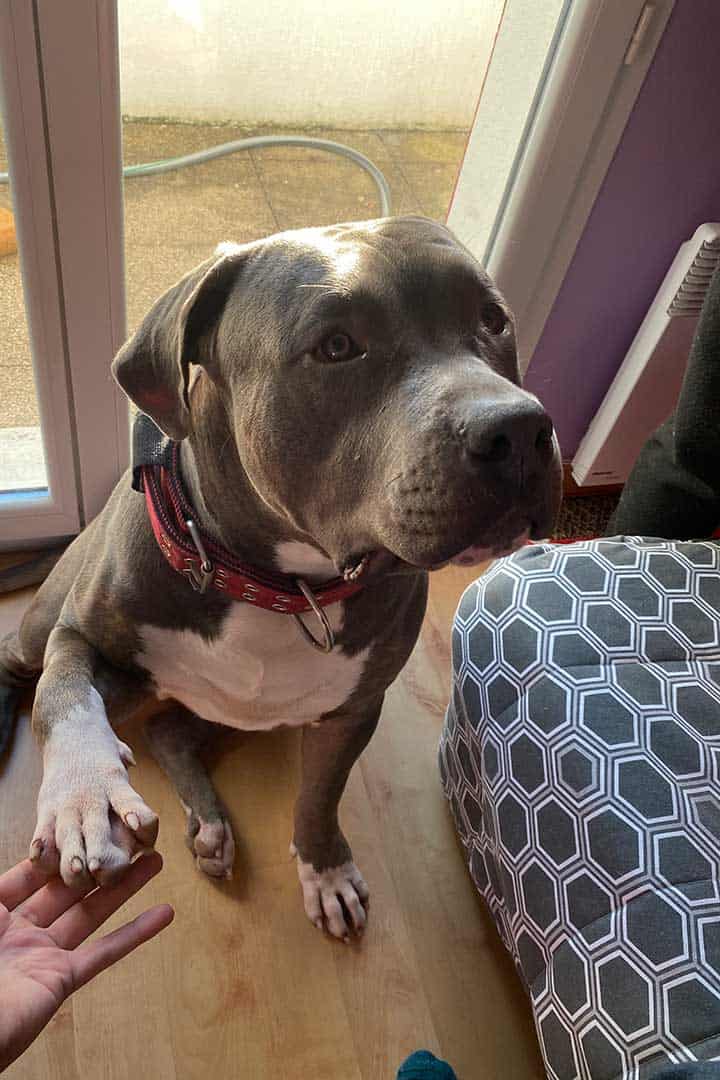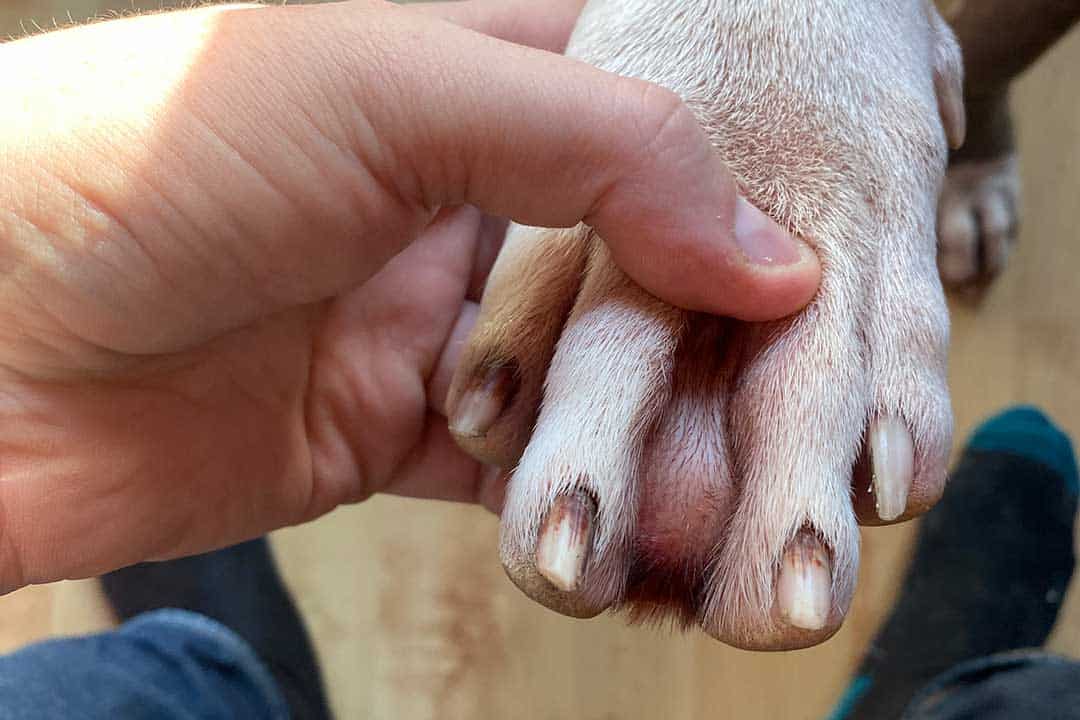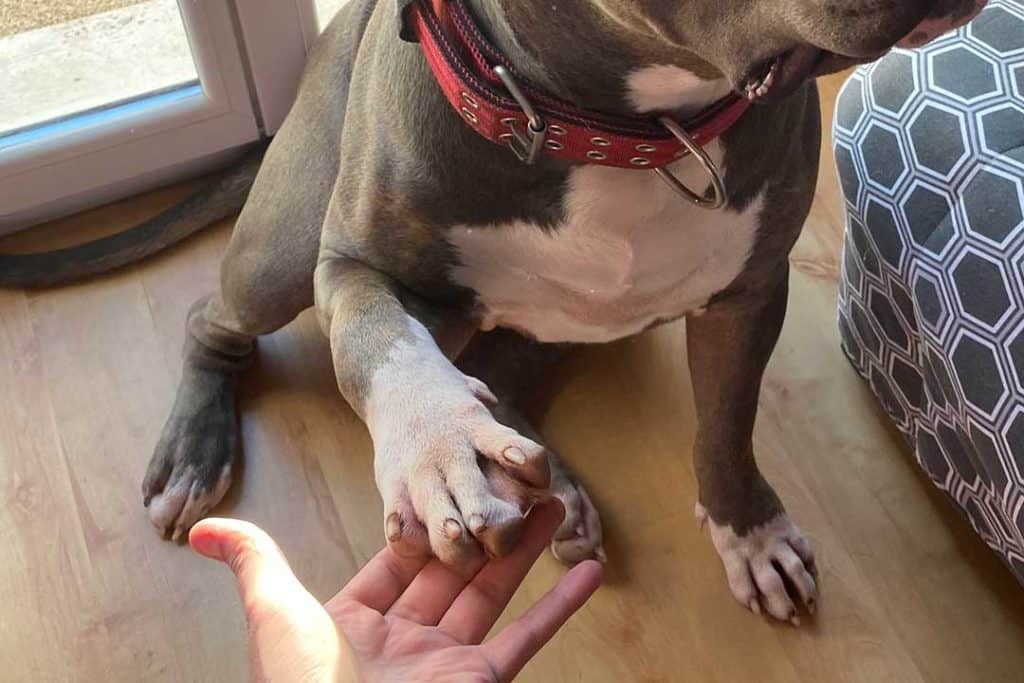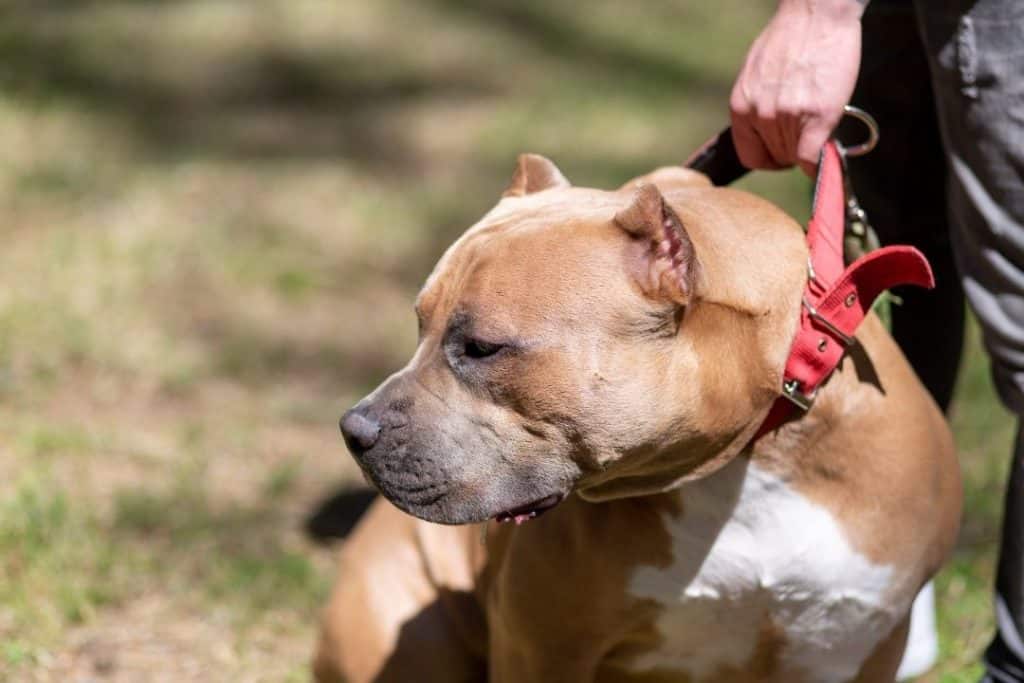This article may contain affiliate links, and I will be compensated if you make a purchase after clicking on my links (at no additional cost to you)
Have you ever played with your American bully or clipped her toenails and noticed some skin between her toes? You might be tempted to think that your American bully has webbed feet like a labrador, but this is not the case.
American bullies have webbed feet, like all dogs, but it isn’t usually as excessive as ‘water dogs’ like labradors or golden retriever. Your American bully may have some connective tissue between his toes.
If your American bully loves the water, don’t worry. He can still swim safely without 100% webbed feet. In this article, I’ll explain why American bullies don’t have webbed feet and why that shouldn’t stop your bully from swimming.
Webbed Feet on Purebred American Bullies
The American bully is a relatively young breed of dog. The American Bully Kennel Club only recognized it in 2004. The breed is still not recognized by the American Kennel Club. The breed mostly stems from the American Pit Bull Terrier with some traits from American and English Bulldogs. The resulting breed is your loveable, good-tempered American bully.
The breed standards for American bullies say nothing about webbed feet. Webbed feet are not a requirement for the breed, nor are they a disqualifying trait. There just isn’t much information out there about webbed feet on American bullies.
But there is information about webbed feet on pit bulls, one of the main “parent breeds” of American bullies. Pit bulls and American bullies aren’t the same, but there are a lot of physical similarities between them, thanks to the way American bullies were bred – and pit bulls do not have webbed feet.
Not a Bully, an organization dedicated to raising awareness about misunderstood dogs like pit bulls, has a great article about webbed feet on pit bulls. They clearly state that purebred pit bulls do not have webbed feet. Pit bulls may have a small amount of connective tissue between the toes, but not the true “webbing” of water dogs.
American bullies, like pit bulls, are not water dogs. Even though the breed standards are silent about the issue of webbed feet, it is safe to assume that a purebred American bully should not have webbed feet.
What Should My American Bully’s Feet Look Like?

The American Bully Kennel Club may not say anything about webbed feet on American bullies, but they do have some requirements and penalties surrounding a dog’s feet.
Your American bully’s feet should be rounded, medium size (not too big or too small), arched, and with tight, compact toes according to breed standards. Long toes, flat feet, and splayed feet are all considered faults.
Your dog’s feet should face forward and not be tilted inward (“pigeon-toed”) or outward (“east-west”). His toes should stay together and not splay out so that the whole foot has a compact, round shape. His feet should not be the most prominent part of his appearance.
The connective tissue between your dog’s toes should only be visible when you splay her toes and look closely. The tissue ought to be thin, shallow, and not prominent. All dogs have this tissue, just like the connective tissue between a human thumb and forefinger.
What if My American Bully Does Have Webbed Feet?

Say you’ve read all this, and you still think your American bully has webbed feet – maybe the tissue between his toes is thick and looks like a duck’s foot when splayed. If that’s the case, you may be right – your American bully may have webbed feet – however, that’s probably due to a problem with his genetics.
American bullies may have webbed feet if they have another breed mixed in, such as a poodle, labrador, or dachshund. Webbed feet might also be the result of a genetic abnormality.
Webbed feet are a sign that your American bully might not be purebred. Sometimes traits from three or four generations ago can appear in descendants, resulting in webbed feet in an otherwise normal-looking American bully. Your bully may have a water dog in her ancestry, which is why she has webbed feet.
If you want to learn more about your American bully’s pedigree, consider ordering an Embark Dog DNA Test Kit from Amazon.com. It costs a pretty penny, but it can put your mind at ease to know your dog’s heritage. If you see that he has a water dog in his ancestry, it’s safe to assume that is why he has webbed feet, and it’s not due to a genetic condition.
However, if your American bully is purebred, she might have a genetic abnormality that causes webbed feet. This abnormality could cause other, more serious health conditions, so make sure to ask your vet about it the next time you see them.
Why Do Some Dogs Have Webbed Feet?
Webbed feet are common in many dog breeds, including labs, Newfoundlands, dachshunds, pointers, and retrievers. Most of these breeds are notable for being water dogs, dogs bred to swim and retrieve waterfowl.
Some dogs have webbed feet because of selective breeding. These dogs were bred to be great swimmers or diggers. Webbed feet help dogs swim faster to retrieve waterfowl and dig faster to hunt rodents and underground mammals.
A lab’s paws are like paddles on a boat or flippers on a diver. Their wide, webbed feet make them excellent swimmers, which is why labrador retrievers are some of the most popular waterfowl retrieving dogs. Humans have selectively bred them to be skillful and comfortable in the water.
Dachshunds use their webbed feet for digging, not swimming. They were bred for hunting badgers burrowing underground. A dachshund’s webbed feet work like tiny shovels, able to move large amounts of dirt very quickly. Again, this trait was bred into the breed to make the dogs more useful for humans.
American bullies do not have webbed feet because they were not bred for swimming or digging. They were bred to have a loving temperament and a low “prey drive” (the instinct that pushes dogs to hunt). Webbed feet are typically found in hunting dogs, and American bullies are not hunters.
American Bullies Webbed Paws and Swimming
If your American bully is like most dogs in his breed, he only has a small amount of connective tissue between his toes and not true webbed feet. He won’t be as good of a swimmer as dogs with webbed feet, but he can still swim.
You should not push your American bully to swim if she does not want to. However, if she already likes the water, you can let her swim under supervision.
American bullies are not natural swimmers. They were not bred for swimming, so your bully may not like the water. That’s ok – not all dogs like to swim. Because swimming does not come naturally to your American bully, make sure to never leave him unsupervised in the water.
When you take your American bully swimming, she should always wear a life jacket. She may like swimming, but her feet and build were not designed for long periods in the water. It’s best to err on the safe side and keep her in a life jacket, just in case.
Fortunately, doggy life jackets are easy to come by. You can find an affordable one online pretty easily. I recommend the Outward Hound Dog Life Jacket from Amazon.com – it has thousands of positive reviews to back it up, and you can find it in several colors. Additionally, the bright colors ensure your pet will always be visible while he’s swimming, so you can be confident that he’s safe.
You may think it’s silly to put your dog in a life jacket, but it’s always better to be safe than sorry!
Final Thoughts
A purebred American bully should not have webbed feet. All dogs have some connective tissue between their toes, but only select breeds have truly webbed feet to help them swim, dig, and hunt.
Your American bully can still swim even without webbed feet, but you should always use caution when taking your dog swimming and always use a life jacket. Additionally, always make sure to consult your vet if you have any questions about your bully’s feet and swimming ability.

I created this blog to share my passion for bullies, and help current and future pitbull owners with things like diet and education.
Hope you find it useful, don’t hesitate to drop a comment on my articles!



